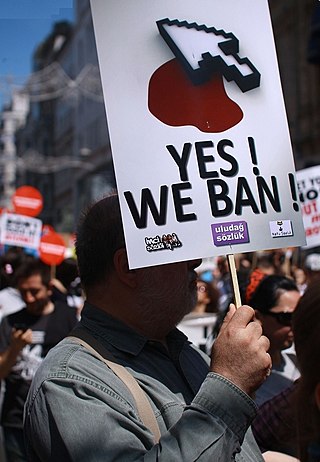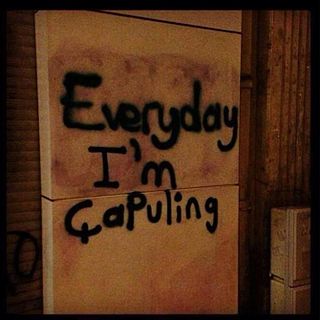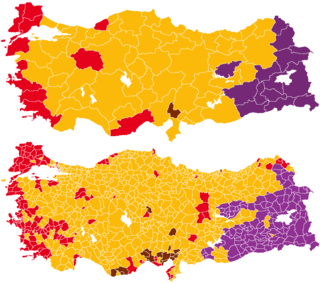
The Republican People's Party is a Kemalist and social democratic political party in Turkey. It is the oldest political party in Turkey, founded by Mustafa Kemal Atatürk, the first president and founder of the modern Turkish Republic. The party is also cited as the founding party of modern Turkey. Its logo consists of the Six Arrows, which represent the foundational principles of Kemalism: republicanism, reformism, laicism (Laïcité/Secularism), populism, nationalism, and statism. It is currently the second largest party in Grand National Assembly with 130 MPs, behind the ruling conservative Justice and Development Party (AKP).

Censorship in Turkey is regulated by domestic and international legislation, the latter taking precedence over domestic law, according to Article 90 of the Constitution of Turkey.
Adil Serdar Saçan was a Turkish police chief who oversaw numerous high-profile investigations. He supervised the Istanbul police force's Anti-Smuggling and Organized Crime Department, which he established in 1998.

Kemal Kılıçdaroğlu is a Turkish economist, retired civil servant and social democratic politician. He is the leader of the Republican People's Party (CHP) and has been Leader of the Main Opposition in Turkey since 2010. He served as a member of parliament for Istanbul's second electoral district from 2002 to 2015 and as an MP for İzmir's second electoral district as of 7 June 2015.

TBMM TV, or Parliament TV, is a Turkish TV channel which broadcasts discussions held in the Grand National Assembly of Turkey; the channel shares frequencies with TRT 3.
A9 TV was a Turkish television station that started broadcasting on March 21, 2011 via Turksat satellite television channel broadcasting. Much of the programming includes religious and English language content, with an emphasis on creationism over evolution and Darwinism. A substantial amount of content features Islamic creationist and cult leader Adnan Oktar. In 2018, the channel was fined several times by the country's broadcasting regulator Radio and Television Supreme Council (RTÜK).

A wave of demonstrations and civil unrest in Turkey began on 28 May 2013, initially to contest the urban development plan for Istanbul's Taksim Gezi Park. The protests were sparked by outrage at the violent eviction of a sit-in at the park protesting the plan. Subsequently, supporting protests and strikes took place across Turkey, protesting against a wide range of concerns at the core of which were issues of freedom of the press, of expression and of assembly, as well as the AKP government's alleged erosion of Turkey's secularism. With no centralised leadership beyond the small assembly that organised the original environmental protest, the protests have been compared to the Occupy movement and the May 1968 events. Social media played a key part in the protests, not least because much of the Turkish media downplayed the protests, particularly in the early stages. Three and a half million people are estimated to have taken an active part in almost 5,000 demonstrations across Turkey connected with the original Gezi Park protest. Twenty-two people were killed and more than 8,000 were injured, many critically.

Chapulling is a neologism originating in the Gezi Park protests, coined from Prime Minister Erdoğan's use of the term çapulcu to describe the protesters. Çapulcu was rapidly reappropriated by the protesters, both in its original form and as the anglicized chapuller and additionally verbified chapulling, given the meaning of "fighting for your rights". Chapulling has been used in Turkish both in its anglicized form and in the hybrid word form çapuling.
The following is a timeline of the Gezi Park protests in Turkey of citizens and supporters against actions and plans of the government of Turkey. The timeline is segmented into days.
Hayatın Sesi TV was a Turkish nationwide TV channel established in 2007. It is one of the Turkish channels which gave extensive live coverage of the 2013 protests in Turkey; one of its reporters, Ismail Afacan, was injured by a water cannon.
The 2013 Gezi Park protests in Turkey saw massive amounts of censorship and disinformation by the mainstream media, especially by those supporting Prime Minister Recep Tayyip Erdoğan and his Justice and Development Party (AKP). A poll done by Istanbul Bilgi University in the first week of the protests showed that 84% of the demonstrators cited the lack of media coverage as a reason to join the protests, higher than the 56% of protesters who referred to the destruction of Gezi Park.

Yiğit Bulut is a Turkish journalist, conspiracy theorist, and since July 2013, a senior advisor to president Recep Tayyip Erdoğan. He was editor-in-chief at news channels Habertürk TV (2009–2012) and Kanal 24 (2012–2013). He was also a contributor to the daily newspapers Radikal (2001–2007), Vatan and Referans, Habertürk (2009–2012) and Star (2012–2013). He was appointed a senior advisor to current president Recep Tayyip Erdoğan while he was serving as prime minister in July 2013. His appointment drew criticism for remarks he had made about the 2013 protests in Turkey that had alleged various conspiracies aimed at toppling Erdoğan, including a claim that foreign forces were trying to murder Erdoğan using "telekinesis and other methods".

General elections were held in Turkey on 7 June 2015 to elect 550 members to the Grand National Assembly. This was the 24th general election in the history of the Turkish Republic, electing the country's 25th Parliament. The result was the first hung parliament since the 1999 general elections. Unsuccessful attempts to form a coalition government resulted in a snap general election being called for November 2015.

Muharrem İnce is a Turkish physics teacher, school principal, sport executive, and politician. He founded and is leader of the Homeland Party since May 2021. Formerly a four term Republican People's Party MP for Yalova, his hometown, he also served as the CHP's parliamentary group deputy chairman between June 2010 and August 2014.

The 33rd Republican People's Party Ordinary Convention was held on 22 and 23 May 2010 in order to elect a new leader following the resignation of Deniz Baykal after a sex-tape scandal. The only candidate was former CHP parliamentary group leader Kemal Kılıçdaroğlu, who was both nominated and unanimously elected with a record share of the delegates' votes.
In the run-up to the Turkish general election of June 2015, many political parties engaged in campaign efforts to increase their vote shares. The main contesting parties were the governing incumbent Justice and Development Party (AKP) led by Ahmet Davutoğlu, the Republican People's Party (CHP) led by Kemal Kılıçdaroğlu, the Nationalist Movement Party (MHP) led by Devlet Bahçeli and the Peoples' Democratic Party (HDP) co-led by Selahattin Demirtaş and Figen Yüksekdağ. These four parties are the only parties with a realistic chance of surpassing the 10% parliamentary threshold to gain representation in the Grand National Assembly of Turkey
In the run-up to, during and after the Turkish general election of June 2015, numerous accusations of electoral fraud and violence were made by opposition parties. Electoral fraud in Turkey has usually been most extensive during local elections, where individual votes have significantly larger impact in determining local administrations. Although the 2014 presidential election saw little evidence of electoral misconduct, issues regarding voter records as well as extensive media bias have been controversial issues that have remained largely unaddressed. In both the local and presidential elections in 2014, several voters reported that ballot papers had been sent to addresses that are wrong or do not exist as well as voters that have been dead for a substantial amount of time.
The political conflict between the AKP-ruled Turkish government and the Gülen movement of Fethullah Gülen began in 2013.

The Republican People's Party election campaign of June 2015 was the election campaign of the Republican People's Party (CHP), the main opposition political party in Turkey. The campaign, which was mainly centred on the slogan Yaşanacak Bir Türkiye, was for the June 2015 general election. Before the election, the CHP had signed a deal with the American election strategy firm Beneson Strategy Group to assist with the campaign.

The March for Justice was a 450 km (280-mile) march from Ankara to Istanbul to protest against arrests that were made as part of the government crackdown following the July 2016 coup d'état attempt. After the coup attempt, the ruling Justice and Development Party (AKP) government declared a state of emergency. Since then at least 50,000 people have been arrested and another 140,000 people have been removed from their positions. The protest was led by opposition leader Kemal Kılıçdaroğlu, in response to a lengthy prison sentence that Enis Berberoğlu received for allegedly giving the press a video that shows Turkish intelligence smuggling weapons into Syria. The march concluded in Istanbul on 9 July with a rally attended by hundreds of thousands of people, during which Kılıçdaroğlu spoke at length about the effect that the government purge has had on the judiciary and rule of law in Turkey.












